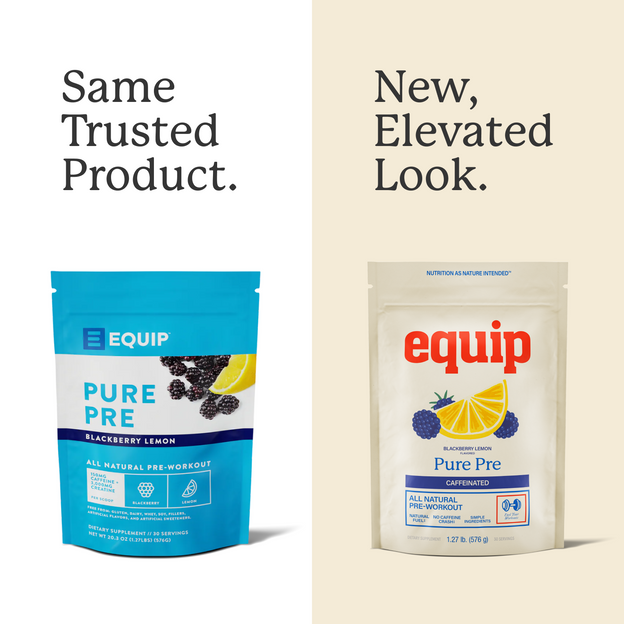Not all sugar is created equal, and your body knows it.
Its form factor and chemical makeup changes how your body processes it which affects energy, fat storage, and even liver load.
Sugar gets a lot of attention, and for good reason. Ultra-processed forms of sugar are everywhere, and overconsumption of refined sweeteners has been linked to blood-sugar volatility, increased hunger, and long-term metabolic strain.
But here’s the part that often gets lost in the conversation: Sugar in its whole-food form is not metabolically equivalent to refined added sugars.
Let’s break it down clearly…
Whole-Food Sugars vs. Refined Added Sugars
Whole-Food Sugars Come in a nutrient matrix. When sugar is naturally present in whole-food ingredients like fruit, honey, or dates, it comes packaged with:
-
Trace minerals
-
Antioxidants
-
Polyphenols
-
Water content
-
In the case of fruit - fiber
This “nutrient matrix” slows down absorption. Instead of hitting the bloodstream rapidly, the sugar is released more gradually = steadier energy and moderated blood-sugar response.
The Real Issue: Concentration and Processing
Fructose shows up in a lot of nutritional debates, especially around high-fructose corn syrup or ultra-concentrated agave. But here’s the nuance that matters: The research showing metabolic stress, fatty-liver risk, and triglyceride spikes comes from high doses of refined fructose, not from whole-food fructose sources.
In other words:
-
16g of sugar from dates and honey does not behave the same as
-
16g of corn syrup in a cereal bar
Same grams, different biological response.
Structure Changes the Glycemic Impact
Refined sugars and syrups are rapidly absorbed. Whole-food sugars are slowed by:
-
Fiber
-
Natural viscosity
-
Water content
-
Micronutrients
These physical properties influence: gastric emptying, glycemic response, insulin demand, and satiety signals. Which is why diets rich in whole fruits consistently correlate with better metabolic markers, while diets high in refined sugar correlate with the opposite.
Where Do Dates and Honey Fit In? (Our Prime Bar sweeteners)
Yes, dates and honey contain fructose. But dates and honey are fundamentally different from high-dose industrialized fructose sources because they are:
-
Whole foods (natural food structure)
-
Consumed in normal dietary amounts, e.g. 1 date, 1 tsp honey
-
Rich in micronutrients and phytochemicals
These forms of sugar are not the villains in modern nutrition. They provide accessible carbohydrates that your body can convert into usable energy. Problems arise when fructose is extracted, concentrated, and stripped of nutrients.
Pairing Carbs With Protein, Fat, or Fiber = Better Energy
Whole-food sugars work even better when paired with protein, fat, or fiber. These nutrients slow digestion, steady glucose absorption, and help turn quick energy into longer-lasting, more stable fuel.
That’s why a bar or shake that combines natural sugars with protein and whole-food ingredients delivers energy that feels smoother, more sustained, and less “spiky.”
Our Philosophy
We recognize a lot of our customers are keto or low carb - that’s why our original line of Prime Protein is sweetened with stevia and is not going anywhere!
For those open to consuming modest amounts of sugar, we have our Prime Protein low sugar line, sweetened with coconut sugar and monk fruit, as well as our Prime Bars, sweetened with one date and one teaspoon of honey – paired with protein and fat to steady absorption for long-lasting fuel.
The sweeteners we use come from real-food sources, used in diets for centuries - not refined sugars, artificial junk, or hyper-processed syrups.
A Better Way to Think About Sugar
✔ Sugar in whole-food ingredients makes sense in a nutrient-dense diet - clean fuel!
✔ It supports flavor and enjoyment without relying on chemical sweeteners.
✔ It delivers energy with minerals, antioxidants, and natural compounds.
✔ It avoids the pitfalls of concentrated, ultra-processed forms of fructose.
The takeaway? Not all sugar is created equal. Whole-food sugars behave differently in the body than refined added sugars, and that difference matters.


